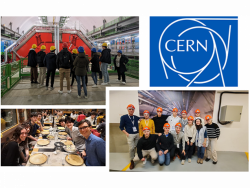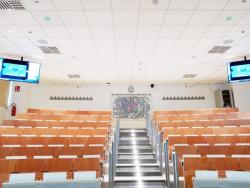Student Information
The BSc Degree in Physics at the University of Trieste, categorised as a Degree course in Physical Sciences and Technologies (L-30), offers high-level cultural preparation and professional training that allow graduates to obtain employment rapidly or to choose to study for a higher degree in physical sciences. Students who pass all examinations and successfully discuss a thesis on a topic focusing on research, industry or education obtaining 180 ECTS are awarded a Degree in Physics (Laurea Triennale in Fisica), which is an academic title that corresponds to the English Bachelor’s degree or the French Licence.
The University of Trieste is part of the Erasmus Programme (to study or do an internship in another European country): for the Bachelor Degree Programme in Physics, agreements are established with European universities such as Copenhagen, Granada, Oviedo, Paris 6, Paris 11, Manchester.
The Inter-University Master’s Degree in Physics is jointly delivered by the Universities of Trieste and Udine. It is a two-year course that is organised in line with Italian Ministerial Decree DM 270/04.
Students who pass all examinations of the MSc course and successfully discuss a thesis on a scientific topic focusing on research, industry or education, are awarded the MSc Degree in Physics (Laurea Magistrale in Fisica).
The Course is structured into the following three curricula:
- Condensed Matter Physics
- Nuclear and Subnuclear Physics
- Theoretical Physics
- Astrophysics and Cosmology
- Terrestrial and Environmental Physics
The course aims to provide postgraduate students with a solid scientific preparation and excellent practical skills in frontier fields of Physical Sciences. The course offers training in experimental analysis and the use of modern technologies and devices combined with in-depth study of theoretical elements and mathematical and computing techniques, which will enable postgraduates to carry out scientific research in complete autonomy and to develop problem solving skills that they will be able to apply in highly qualified jobs or in further studies, if they wish to enter the world of research or to improve their professional stance (i.e. PhD, Specialisation Schools where Physics is important).




